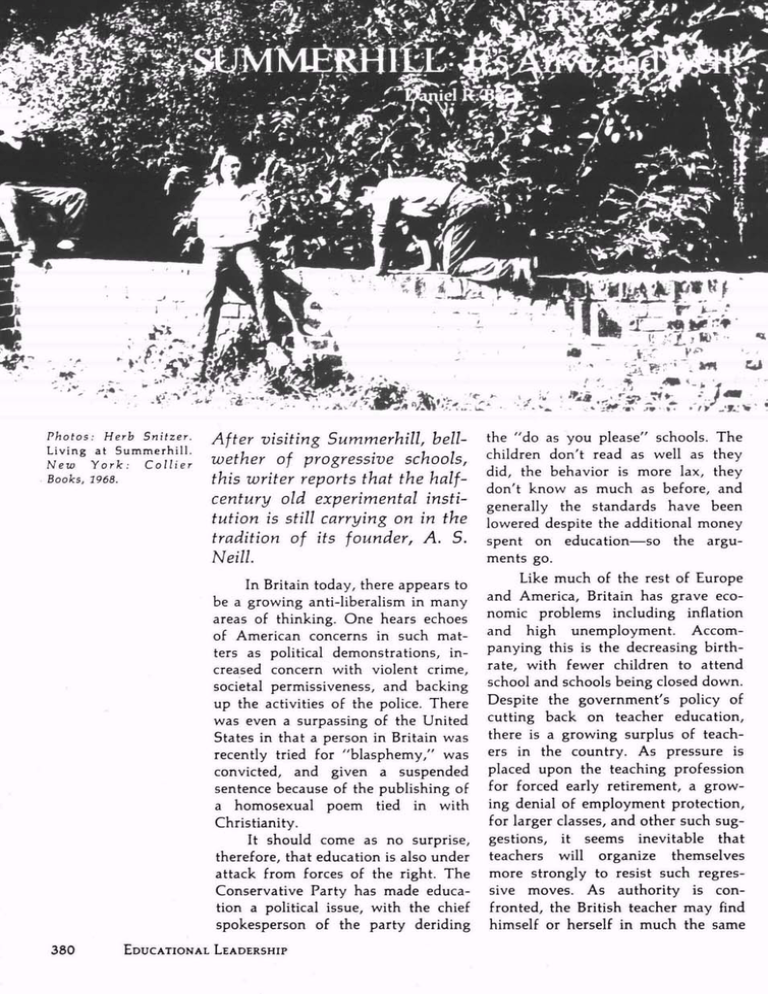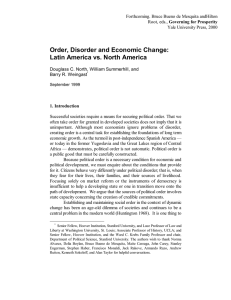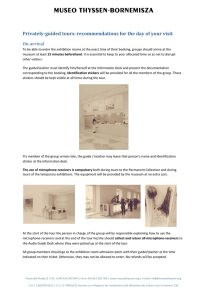Summerhill: It`s Alive and Well
Anuncio

i -* -..- Photos: Herb Snitzer. Living at Summerhill. New fork: Collier Books, 1968. After visiting Summerhill, bell wether of progressive schools, this writer reports that the halfcentury old experimental insti tution is still carrying on in the tradition of its founder, A. 5. Neill. In Britain today, there appears to be a growing anti-liberalism in many areas of thinking. One hears echoes of American concerns in such mat ters as political demonstrations, in creased concern with violent crime, societal permissiveness, and backing up the activities of the police. There was even a surpassing of the United States in that a person in Britain was recently tried for "blasphemy," was convicted, and given a suspended sentence because of the publishing of a homosexual poem tied in with Christianity. It should come as no surprise, therefore, that education is also under attack from forces of the right. The Conservative Party has made educa tion a political issue, with the chief spokesperson of the party deriding 380 EDUCATIONAL LEADERSHIP the "do as you please" schools. The children don't read as well as they did, the behavior is more lax, they don't know as much as before, and generally the standards have been lowered despite the additional money spent on education so the argu ments go. Like much of the rest of Europe and America, Britain has grave eco nomic problems including inflation and high unemployment. Accom panying this is the decreasing birth rate, with fewer children to attend school and schools being closed down. Despite the government's policy of cutting back on teacher education, there is a growing surplus of teach ers in the country. As pressure is placed upon the teaching profession for forced early retirement, a grow ing denial of employment protection, for larger classes, and other such sug gestions, it seems inevitable that teachers will organize themselves more strongly to resist such regres sive moves. As authority is con fronted, the British teacher may find himself or herself in much the same position as the American teacher, no longer passive, and as a consequence, no longer loved. %.¥, Summerhill Still Flourishes Out of such a generally gloomy picture, it is a pleasure to be able to say that Summerhill still flourishes in Leiston, England. There were many of us who felt that Summerhill would cease to exist after A. S. Neill, the founder, was gone. That never seemed to be the thought of Neill himself who expressed every confidence that the school remained in good hands. Shortly before he died in September 1973, he spoke of wanting Ena to carry on the school stating that she knew the system inside out and would carry on the 50-year-old tradition of Summerhill. At the time of the present writ ing (June 1977), there are 64 children who are boarders and 18 children who are day students. There are 12 staff members, of whom eight are teach ers. The subjects taught are English, French, German, Ecology, Science, Biology, Mathematics, Wood and Metal Work, Pottery, Art, Hand work, and Music by arrangement. Of the children, about 60 percent are from foreign countries, coming from all parts of the world. The fees for children up to 12 years of age are £400 per term and for those over 12 years of age £450 per term with laundry an additional £12.50 per term. Children get pocket money weekly in the school, and the parents are requested by the school not to send additional money except on birthdays or at Christmas. Perhaps the greatest contribution of Summerhill (borrowed with modi fications from Homer Lane's Little Commonwealth) has been its prac tice of self-government. The children still determine the rules governing their daily lives at school. When Peter FEBRUARY 1978 381 Wood, stepson of Neill, was ques tioned about it, he stated that the Saturday night meetings remain the same as before in that the children work out the problems facing them as a living community. Summerhill is not a "do as you please" school as it is thought to be by a surprising num ber of people in Britain. The children are bound in by community rules that they develop themselves. Basic safety rules are still insisted on by the adults, and the business aspect of the school is not within the province of the children's concerns. Beyond these, however, the everyday, important liv ing decisions are theirs, with each of their votes counting equally to those of each of the adults. In addition, the child still has the choice of which classes to attend or whether he or she will attend any classes at all. The child has maximum freedom with almost the only limits being safety rules or when his or her freedom infringes on the rights of the others. Such infringements, real or supposed, still make up the majority of Satur day night meeting agendas. It is a kind of irony that this most open of schools is far from open to visitors. Sometime back, the entire community voted that visitors not be allowed, and a sign at the entrance to Summerhill so states. In the past, visitors would sometimes come in by the busload and inundate this small school. The children objected to being looked at and to being questioned. They were too often made to feel like laboratory specimens of some kind by people who had no understanding of the school. Beyond that, the children simply do not want their time wasted. Visitors No Longer Allowed Early in 1 977, I wrote from America saying that I would be in England in the summer and would like to visit Summerhill. A form reply 382 EDUCATIONAL LEADERSHIP was received stating that the com munity had voted that visitors were no longer allowed. Having become a curmudgeon professor, however, I decided to fight the system. Some days after arriving in England I sim ply took the train from London to Saxmundham, the bus to Leiston, and walked in prepared to be requested to leave. While not welcomed with open arms, I was treated courteously enough and was taken by two of the children to meet with Peter. We talked together for a bit about Summerhill as children wan dered in and out sometimes listening and joining in the conversation. It was a Saturday, and the children did not have classes. I then met Ena who reaffirmed the "no visitor" rule, but said that I could wander around the school grounds if I wished and talk with any of the children who would talk with me. This I proceeded to do. I returned to London in the after noon and wrote a letter to Ena and Peter asking the community's per mission to return to Summerhill a week hence with the idea of perhaps writing an article giving a status re port on the school. Ena is not terribly enthusiastic about articles being writ ten about Summerhill, but my request was not denied. I returned and once again met with Peter and a number of the children. I was able to be there well into the afternoon. There is no question that the buildings and the grounds have a "lived in" look. Most of the furniture is old and in various states of dis repair. There are flower beds and vegetable gardens outdoors, but not kept in the immaculate condition of, say, Gordontoun School in Scotland. In the larger grassy area behind the main building were spread about 14 or 15 pup tents. Bikes were scattered here and there along with other possessions. The children seemed friendly enough but did not cluster around me as children so often do at other schools when there is a visitor. There certainly was no attempt to impress me with their abilities, cuteness, or whatever. There was, perhaps, suspi cion on their parts that I was there to look at them as Summerhill ob jects. I also had the impression that they behaved in a way somewhat analogous to that of persons who have spent much time in the care of psychiatrists and who know what the questions will be from the new ana lyst before he or she asks those very questions. One boy, age 14, had been at Summerhill for two years. He spoke of his great fondness for the school and how it had helped him. He had been extremely tense .before coming here, and this had improved im measurably. Also he talked of how he formerly stole things and was often called to account before the Summerhill community. This was now no longer the case for him. The Special Qualities Two older boys from Italy were visiting the school. They had been students at Summerhill for three years and had been gone for a year. Both affirmed their love for the school and that they immediately felt at home upon their return. They indi cated, also, that there had been no academic problem for them in their new school. There were less than two weeks left in the term and two young ado lescent girls were lamenting the fact of how they would miss Summerhill during the vacation period. One was particularly sad because her parents were moving, and she would not be returning here. Like the other chil dren with whom I spoke, they recog nized the special qualities of Summerhill. I observed one short fight be tween a girl of about 11 and a boy of about 10. He was pestering her and she finally swung and hit him on the shoulder. She then went on her way. There seemed to be no repercussions. My impressions stem from two short visits to the school. But these impressions are of secondary imporDaniel R. Bock is Pro fessor, Educational Foundations Depart ment, Northeastern Illinois University, Chicago. tance to that of letting people know about the status of Summerhill today. The school and its underlying prin ciples have been an inspiration to many of us in education. That it is still alive and well after the death of a great figure like Neill indicates its basic strength. It is my hope that Summerhill will open itself up more to visitors. Obviously, a number of restrictions are necessary upon visitations for the sake of the children and staff. It has been, however, too important a sym bol of children's freedom throughout much of the world for the school to insulate itself from the outside. Now that there is such a reactionary trend in education in a number of coun tries, it is all the more important for the school's ideas to be on constant display. Summerhill can continue to be an inspiration. A postscript to the status of Summerhill: Zoe is now a farmer's wife, living near Summerhill, and is the mother of three children. It would appear that Summerhill will be re ceiving fresh recruits in the near future. SJ FEBRUARY 1978 383 Copyright © 1978 by the Association for Supervision and Curriculum Development. All rights reserved.





